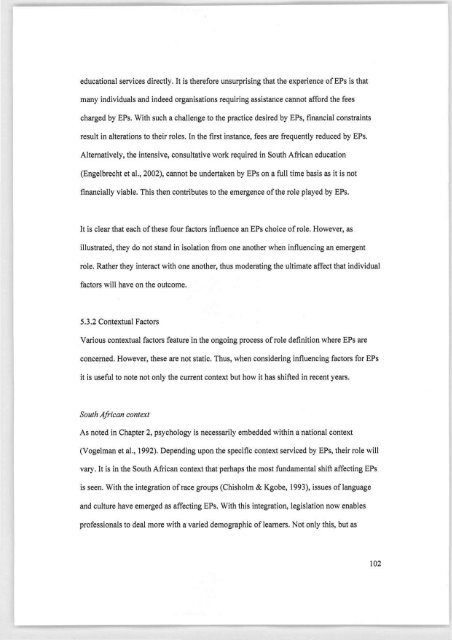Educational psychologists' perceptions of their role in the ...
Educational psychologists' perceptions of their role in the ...
Educational psychologists' perceptions of their role in the ...
Create successful ePaper yourself
Turn your PDF publications into a flip-book with our unique Google optimized e-Paper software.
educational services directly. It is <strong>the</strong>refore unsurpris<strong>in</strong>g that <strong>the</strong> experience <strong>of</strong> EPs is that<br />
many <strong>in</strong>dividuals and <strong>in</strong>deed organisations requir<strong>in</strong>g assistance cannot afford <strong>the</strong> fees<br />
charged by EPs. With such a challenge to <strong>the</strong> practice desired by EPs, f<strong>in</strong>ancial constra<strong>in</strong>ts<br />
result <strong>in</strong> alterations to <strong><strong>the</strong>ir</strong> <strong>role</strong>s. In <strong>the</strong> first <strong>in</strong>stance, fees are frequently reduced by EPs.<br />
Alternatively, <strong>the</strong> <strong>in</strong>tensive, consultative work required <strong>in</strong> South African education<br />
(Engelbrecht et al., 2002), cannot be undertaken by EPs on a full time basis as it is not<br />
f<strong>in</strong>ancially viable. This <strong>the</strong>n contributes to <strong>the</strong> emergence <strong>of</strong> <strong>the</strong> <strong>role</strong> played by EPs.<br />
It is clear that each <strong>of</strong> <strong>the</strong>se four factors <strong>in</strong>fluence an EPs choice <strong>of</strong> <strong>role</strong>. However, as<br />
illustrated, <strong>the</strong>y do not stand <strong>in</strong> isolation from one ano<strong>the</strong>r when <strong>in</strong>fluenc<strong>in</strong>g an emergent<br />
<strong>role</strong>. Ra<strong>the</strong>r <strong>the</strong>y <strong>in</strong>teract with one ano<strong>the</strong>r, thus moderat<strong>in</strong>g <strong>the</strong> ultimate affect that <strong>in</strong>dividual<br />
factors will have on <strong>the</strong> outcome.<br />
5.3.2 Contextual Factors<br />
Various contextual factors feature <strong>in</strong> <strong>the</strong> ongo<strong>in</strong>g process <strong>of</strong> <strong>role</strong> def<strong>in</strong>ition where EPs are<br />
concerned. However, <strong>the</strong>se are not static. Thus, when consider<strong>in</strong>g <strong>in</strong>fluenc<strong>in</strong>g factors for EPs<br />
it is useful to note not only <strong>the</strong> current context but how it has shifted <strong>in</strong> recent years.<br />
South African context<br />
As noted <strong>in</strong> Chapter 2, psychology is necessarily embedded with<strong>in</strong> a national context<br />
(Vogelman et al., 1992). Depend<strong>in</strong>g upon <strong>the</strong> specific context serviced by EPs, <strong><strong>the</strong>ir</strong> <strong>role</strong> will<br />
vary. It is <strong>in</strong> <strong>the</strong> South African context that perhaps <strong>the</strong> most fundamental shift affect<strong>in</strong>g EPs<br />
is seen. With <strong>the</strong> <strong>in</strong>tegration <strong>of</strong> race groups (Chisholm & Kgobe, 1993), issues <strong>of</strong> language<br />
and culture have emerged as affect<strong>in</strong>g EPs. With this <strong>in</strong>tegration, legislation now enables<br />
pr<strong>of</strong>essionals to deal more with a varied demographic <strong>of</strong> learners. Not only this, but as<br />
102
















